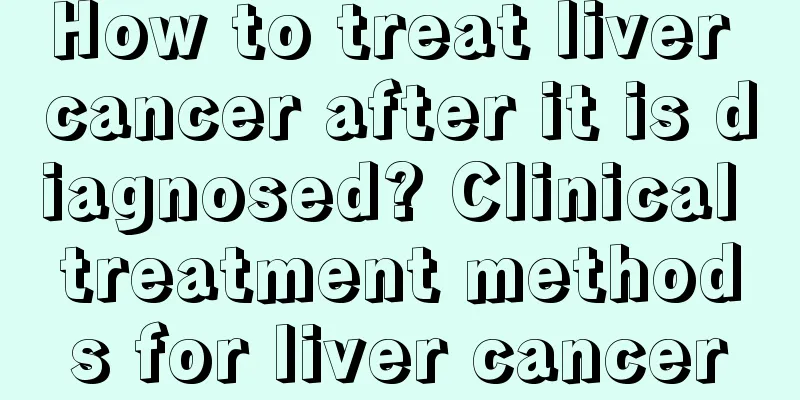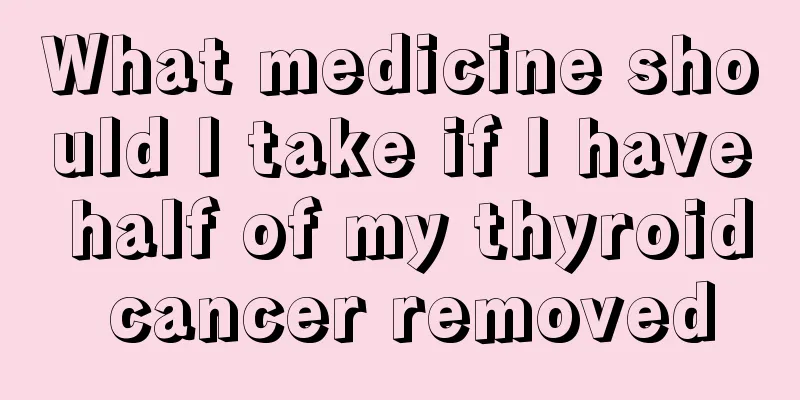How to treat liver cancer after it is diagnosed? Clinical treatment methods for liver cancer

|
Liver cancer is one of the most common malignant tumors in my country, and its incidence has gradually become younger in recent years. The prognosis of patients in the middle and late stages is poor, so it is best to detect and treat liver cancer early, as it is difficult to cure patients in the middle and late stages. Here we will briefly introduce the Western medicine treatment of liver cancer. Surgery The traditional treatment for liver cancer is surgical resection, but not all liver cancer patients are suitable for surgery. Only patients with good cardiopulmonary function, localized liver tumors, and no metastasis are suitable for surgery. In addition, most liver cancer patients in my country have a history of hepatitis and cirrhosis, and about 80% of patients cannot undergo surgery for various reasons. There are many non-surgical treatments for liver cancer, and each treatment has its own indications. Only the method that suits the patient is the best method. The appropriate treatment method should be selected based on the patient's physical condition, liver function status, and tumor condition. Interventional treatment It is also a commonly used method, so what are the limitations of this method? Liver cancer mainly relies on the hepatic artery for blood supply, but there is portal vein blood supply around the cancer mass, so cancer cells can "survive in peace". Even if the operation is carried out smoothly, due to high-pressure injection and other reasons, it may cause accidental thrombosis, shunting and inevitable micro-metastasis; some patients have blood vessels blocked after one treatment, making it difficult to operate again. Disadvantages of interventional treatment: 1. Liver cancer's main blood supply depends on the hepatic artery, but the cancer mass is surrounded by the portal vein, so cancer cells can "survive in peace". 2. The operation is somewhat difficult. The catheter should be placed in the blood supply artery in a selective manner to achieve the best effect. However, sometimes it is difficult to enter the hepatic artery. However, some liver cancers can be supplied by multiple blood vessels. 3. Despite super-selective access, there are still obvious side effects. According to the data analysis of our hospital, the most common reactions are in the gastrointestinal tract. 4. Patients with portal vein cancer thrombus should consider removing the cancer thrombus as appropriate. 5. Even if the superselective operation is carried out smoothly, due to reasons such as high-pressure injection, it may cause accidental embolism, shunting and inevitable micro-metastasis. 6. Normal liver cells are still damaged, and a few patients even suffer from liver dysfunction. 7. The therapeutic effect is not satisfactory for patients with large cancer masses. 8. Some patients’ blood vessels are blocked after one treatment, making further operations difficult. Interventional treatment of liver cancer has many advantages: 1. The therapeutic effect is definite. Those who are successfully treated can see a rapid decrease in AFp, reduction in tumor size, and relief of pain. 2. Scientific mechanism: The local drug concentration of interventional therapy is dozens of times higher than that of systemic chemotherapy, and it blocks the blood supply to the tumor. Therefore, the two-pronged approach has good efficacy and less toxicity than systemic chemotherapy. 3. Simple and easy operation, safe and reliable. 4. The elderly, weak and those with certain diseases can also undergo the procedure without general anesthesia and they just need to stay awake. 5. The cost is relatively low. 6. It can be repeated, and the diagnostic imaging is clear and easy to compare. 7. For some liver cancers, the size can be reduced and then resected in two steps. 8. It can be used as one of the important means of comprehensive treatment of advanced tumors. my country has been carrying out this work for nearly 20 years and has reported many experiences. Some reports show that the 5-year survival rate of liver cancer with a diameter less than 5 cm after treatment is 33%. The longest case in our hospital has survived for more than 20 years. Radiation therapy It is also one of the main methods for treating liver cancer. With the development of modern radiotherapy technology, many small liver cancers that are not operable in the early stage can be cured by modern radiotherapy, and the liver function damage is relatively small. Taking the body gamma knife as an example, the principle of body gamma knife treatment of liver cancer is similar to the focusing process of a magnifying glass. When a magnifying glass is placed in the sun, a dazzling light spot will appear under the magnifying glass. The temperature outside the light spot does not change much, but the light spot is so hot that it can ignite some objects. Similarly, the radiation dose is concentrated in the tumor area, so that the tumor receives a dose sufficient to kill cancer cells, thereby achieving an ideal treatment effect. Early treatment should be surgical resection as much as possible. Multimodal comprehensive treatment can also be used for large liver cancer that cannot be resected. After surgery, the patient enters the postoperative recovery period. Treatment during the recovery period is particularly important. Because the chances of recurrence and metastasis are very high, residual cancer cells after surgery will metastasize to various parts of the body from time to time. Therefore, postoperative consolidation must be strengthened to prevent its recurrence and metastasis. Liver cancer is troubling more and more patients. As the age of patients is generally getting younger, more attention should be paid to the prevention of liver cancer. It is recommended to have a full body check once or twice a year. If there is any abnormality, early detection and early treatment will have better results. I hope the treatment methods introduced here can be helpful. |
<<: What are the ways to prevent lung cancer? Only by doing so can we prevent lung cancer
>>: What are the common symptoms of liver cancer? Check out the most common symptoms of liver cancer
Recommend
What to do if it hurts when digging your ears
People often use ear picks to remove earwax, but ...
What to do if calluses on feet hurt - How to get rid of calluses on feet
The calluses on the feet that we usually talk abo...
Cost of treatment for advanced prostate cancer
Prostate cancer is one of the leading causes of c...
The hazards of spray paint and methods of detoxification
We all know that spray painting is a highly pollu...
What fruits can soften blood vessels
As living standards continue to improve, more and...
How to wash sand off a swimsuit
Swimming is a form of exercise that many people l...
Is melanoma easy to cure?
Melanoma is a tumor that develops from melanocyte...
What to do if white clothes turn yellow after being soaked
Although white clothes look good and are easy to ...
Nursing routine for patients with endometrial cancer
We all know that there are many diseases that thr...
What are the hazards of freezing point hair removal
For women, beauty is something they always pursue...
What medicine should I use if I'm bitten by a bedbug
Speaking of bedbugs, I believe everyone hates the...
Do you know the cost of gene testing for targeted therapy? Let me tell you in detail below
With the development of world medicine, clinical ...
Is microwave radiation strong?
We all use microwave ovens in the kitchen, and th...
What material is good for dentures
Dentures are artificially created simulated teeth...
The probability of inheritance of high myopia
Myopia not only affects our ability to see things...









